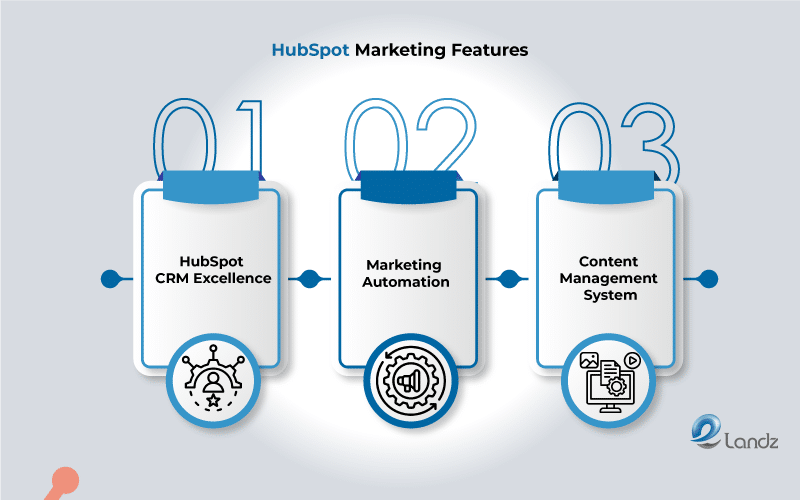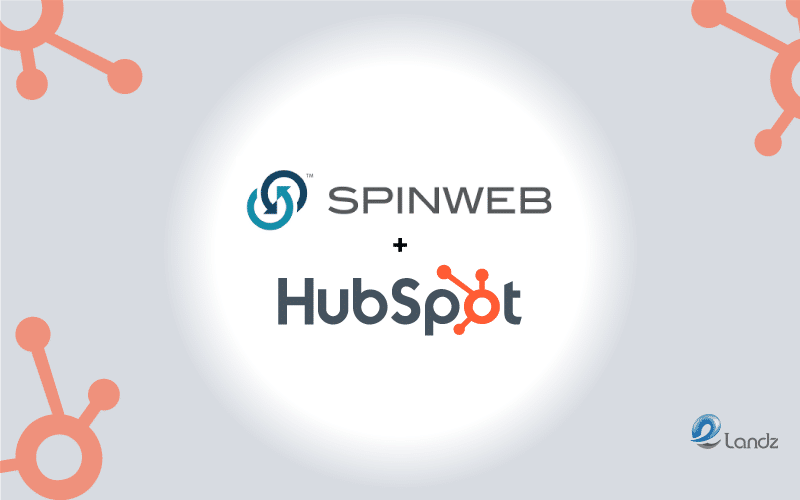
16 Sep Why Choose HubSpot in Your Martech Stack
Introduction
Did you know that HubSpot marketing hub’s annual revenue grew by nearly 2.7 thousand percent in the past ten years? Just what is it about this AI-powered customer platform that makes it so special for marketers?
No doubt, HubSpot offers a promising set of features and more reliability for teams. We shall peel the layers and discuss HubSpot’s advantages for martech stack optimization.
What is HubSpot?
Let’s begin with some big words. HubSpot is a customer relationship management platform. Moreover, it is “THE” tool for inbound marketing and advanced analytics. The online sales software can send the number of customer visits on a rising curve.
If you dissect the meaning even further, HubSpot is a suite of automation and management tools that can turn regular visitors into a dedicated customer base.
Among all these advantages, what is the most fascinating part? HubSpot marketing hub is an all-in-one content management system that assists organizations in unifying marketing and sales.
HubSpot Marketing Hub Benefits
“The first thing to understand about HubSpot is that it isn't just a piece of your marketing technology (Martech) stack.”
“It can become nearly your entire MarTech stack, replacing the patchwork of tools that most businesses use.”
Colin Bovet, growth strategy expert
Whether it’s ad management or HubSpot advertising, it just has so much to offer. Who wouldn’t want to cut down on their costs and manage the most complicated tasks on a single dashboard?
I’ll cover some strengths and features that make HubSpot the perfect partner for your marketing tech stack. Are you ready?
Integration Power
HubSpot brings together multiple tools in a single spot, with minimal hassle. Moreover, you don’t have to worry about the perils of coding. It’s just silky smooth, simple integration with other apps.
In other words, it is like a central data repository, a cellular nucleus that ties together all the essential functions. HubSpot acts as a control center consolidating all marketing and sales activities.
“ Whether you’re using NetSuite for ERP, Google Ad Manager for advertising, or Shopify for e-commerce, HubSpot can serve as the central hub that ties everything together.”
HubSpot’s open API and pre-built integrations make it a highly resourceful platform that seamlessly connects with other marketing and business tools. This interoperability eliminates data silos!
User-Friendly Design

One look at the HubSpot dashboard and get an idea of the flexibility and adaptability it has!
Another factor that comes into play when building a martech stack is how easily a tool works. The intuitive interface makes HubSpot marketing hub the ideal catch for your online digital marketing tech stack.
Also, the layout and inner workings of this AI-driven customer platform are such that it promotes team collaboration and working towards a common goal. This ease of use adds to its impressive list of features for optimizing your martech stack.
Therefore, it becomes easier to use and learn from the CRM platform.
Comprehensive Analytics
Where are your visitors coming from? Which martech tools are a dead load? What AI and automation tools must stay?
Besides being a complete content management system, Hubspot can help you decide what works and what doesn’t. These answers don’t just come in the spur of the moment. They come from detailed analytics and data-driven insights.
Through HubSpot, you can determine what martech tools require improvement or which AI-powered strategies call for adjustment. It doesn’t end here – you can even get in-depth reports on customer behavior or web content performance.
Marketers can analyze the most unexpected traffic sources, like specific marketing channels, casual browsers, or referral points.
Scalability
As an organization develops, the HubSpot online tool sprouts alongside your team. It comes with a tiered marketing plan that you can customize according to the size of your team and the complexity of your marketing technology stack.
It doesn’t matter, if it’s a small startup or a booming marketing agency, Hubspot automation can handle it all. Coming back to small setups, HubSpot offers affordable plans for key services such as target email campaigns, social media posting, and report generation.
At the end of the day, you don’t have to fret about hiring additional employees to do more grunt work. For bigger enterprises, there is a multitude of options to choose from.
For example, the HubSpot sales hub pricing for enterprises is 150 USD monthly. It covers HubSpot payments, optional Stripe integration, product library, and eSignature. The plan has up to 1,000 fully customizable workflows and unlimited email open-and-click notifications.
In contrast, the starter package would cost you 15 dollars per month. It can support up to 5000 documents per account, offers 500 minutes of sales automation, and even has a shared inbox.
You pick, and HubSpot delivers!
HubSpot Marketing Features

The story of HubSpot online hub goes back to 2004 when two MIT students saw a shift in the way people shop! Fast forward to today, 194,000+ customers use HubSpot CRM in 120+ countries. How amazing is that?
Its user-friendly interface invites businesses of all sizes to dive into a world where automation tools, CRM integration, and insightful analytics blend harmoniously. But, that’s not it, there’s more.
HubSpot CRM Excellence
“Salespeople can now quickly identify hidden allies and prioritize their outreach. For example, reps can easily identify who’s been a past customer — and already understands the value of your organization’s offering.”
Micheal Levy, competitive research analysis
Take the example of the integration of HubSpot marketing hub with LinkedIn. Such a partnership encourages team members to work on activities such as developing best practices for sales managers. The risk of wasting time on redundant tasks becomes zero.
Every customer touchpoint becomes an opportunity to sell, discover, and improve. As a result, marketers and salespeople align like never before.
Marketing Automation
Experts predict that the market valuation of marketing automation will reach 13.71 billion USD by 2030.
In my previous articles, there has been an in-depth discussion on the role of artificial intelligence automation in marketing. With software like HubSpot, you can enhance inbound marketing, sales, and customer service all at the same time.
Is it some kind of sorcery? No, it’s the power of cutting-edge tech solutions and state-of-the-art platforms. The chaos of so many interwoven marketing projects and tasks can become overwhelming.
HubSpot fuses creativity and performance to free teammates from the stress of management.
Content Management System (CMS)
Your content is the story of your brand. It is the essence and the online persona that helps customers understand the brand better. Whether it’s a software engineering tech company or a fun cosmetics brand, the online presence can attract an audience.
The drag-and-drop editor offers the freedom to craft visually stunning web pages without sweat. When HubSpot connects with your other marketing tools. It’s like a symphony, where all the instruments sync to release a beautiful melody of marketing success.
Some features that stand out include:
AI-Curated Content Generation
CRM data does not only enrich the customer journey. It sets the tone for a brand voice, relevant content generation, and suitable social media platform posts. Also, gen AI content encompasses blog images and content.
HubSpot CMS system can concoct compelling content and social media updates.
SEO Recommendations
Without SEO visibility, your content doesn’t really have a purpose. Sure, a well-written piece loaded with experiences and a personal element does appeal to the reader. However, certain terms, expressions, and terminologies with a unique writing style set you apart.
HubSpot content management system can drive organic traffic and take your web blog content to a higher level.
Content Remix
So many channels, multiple mediums, and diverse formats – you can’t restrict content to a single platform. What if you could use a single content piece to churn out different forms? Well, HubSpot content management can do that for you!
From SMS mobile marketing to Twitter updates and LinkedIn posts, HubSpot CMS can save you time!
Success Stories
An interesting point is that the HubSpot website has a collection of case studies. Most web pages do not offer such detailed stories. The category division deserves extra appreciation and full points for the presentation!
Digital Marketing Agency SpinWeb Grows Sales Pipeline

SpinWeb is a US-based digital agency that provides inbound marketing services, corporate web solutions, and app development for its clients. The curiosity-fill cat inside me led me to the website and the company’s LinkedIn page.
There are several online articles on how HubSpot and SpinWeb’s collaboration led to some excellent results. SpinWeb was looking for a full-proof system to develop its leads and build its sales pipeline.
“However, they lacked the tools to understand what content was working to generate new leads or customers. They tracked basic metrics with Google Analytics but felt they were limited.”
Isn’t this a problem many growing companies face? They require an all-in-one solution that has hassle-free integration and flawless integration. This is what HubSpot marketing hub did!
Online Lead Generation
Gathering leads is the first step in initiating the inbound sales phase. SpinWeb’s lead either came from their blog or the “Contact Us” page. There wasn’t much clarity and there had to be more mediums for generating online leads. Moreover, this was a call for martech stack improvement.
HubSpot came to the rescue with its search engine optimization tools and keyword suggestion features. As a result, SpinWeb could determine which particular search engine keywords and phrases could help them rank high on the Google Search Engine.
The sudden increase in potential leads had an integral role in SpinWeb’s database expansion. Content is not complete without intent.
Sales Process Automation
What do more leads mean? There has to be more planning, and more thought put into preparing reports. Micheal Web, CEO of SpinWeb sought a solution that would measure business success with laser-like precision.
The CEO saw an opportunity to switch up SpinWeb’s persona and utilize HubSpots marketing tools to navigate the sales funnel. HubSpot’s Contact Timeline gives you just the deepest darkest desires of your leads!
You can see which content strikes the chord, and which is just not working. The integration of the Hubspot marketing hub with SpinWeb’s Membrain CRM enabled sales reps to get a 360-degree view of their prospects.
Is it a cheat code for sales success? No, it is a complete sales acceleration solution that maneuvers customer data to generate better response rates. Close sales deals faster!
HubSpot Comparison
Marketing teams leveraging CRMs are 128% more likely to declare their marketing strategy as effective.
The greatest thing about these HubSpot versions? You can find what fits your online marketing plan. HubSpot emerges as a leading contender due to its strapping suite of tools for your martech stack! Let’s explore and compare HubSpot features with some popular web marketing products.
HubSpot vs Zoho CRM
HubSpot offers a more integrated approach for marketing-related setups. The pricing plans starting with a free-tier one are more scalable as per a thriving company’s demands.
Zoho’s competitive pricing and comprehensive feature set appeal to companies seeking a cost-effective solution without sacrificing functionality. Zoho CRM gives adaptability to those requiring a personalized CRM experience.
HubSpot CMS vs WordPress
HubSpot CMS works well with most marketing automation apps and built-in SEO features, resulting in a user-friendly interface. This makes it a compelling choice for businesses seeking an all-in-one solution that aligns with their objectives.
WordPress has an extensive plugin ecosystem. It might be free, but users often incur costs from purchasing plugins and hosting services, which can add up!
HubSpot Vs Agile CRM
Both Agile CRM and HubSpot have solid integration capabilities. However, HubSpot supports a wider range of applications. Again, these two have lead scoring and task automation.
In terms of sales management tools, HubSpot CRM takes the cake. Agile CRM is known for its advanced phone interface. It means you can automate phone conversations directly from the CRM
HubSpot vs Zapier
Think complete integration – that is what HubSpot brings to the table. Both platforms come with pros and cons. Some online articles even call HubSpot marketing hub the best Zapier alternative.
However, the strongest automation use cases are different. Zapier has a modular experience whereas HubSpot is all about centralization.
Conclusion
From an idea in 2004 to a $50M+ run rate in 2012, HubSpot has become a marketing and automation giant!
Be it HubSpot Wave integrations, or complete marketing automation. HubSpot can be your marketing partner! It can even be your sagacious online sales assistant, and customer support platform. Nowadays, marketing and tech have come a long way from the old days of big billboards and newspaper advertisements.
The digital age has brought with it the ideas of ad tech, marketing technology, social media management, and artificial intelligence automation, and these names are not even half of the list.
HubSpot marketing automation is here to stay.
FAQS
Is HubSpot a martech platform?
Yes, HubSpot is indeed a martech platform.
It provides a comprehensive set of tools that cater to marketing, and sales. With its CRM, email marketing, social media management, and analytics capabilities, HubSpot aids enterprises in customer interaction management and marketing strategies.
Its marketing automation features allow for efficient lead generation and nurturing, while its customer engagement tools ignite personalized communication.
What should be in a martech stack?
A well-rounded martech stack is crucial for modern marketers aiming to amplify their efforts.
Start with a Customer Relationship Management (CRM) system, like Salesforce or HubSpot, to efficiently manage customer interactions. A Content Management System (CMS) such as WordPress is vital for creating and managing digital content. Email marketing software maintains effective communication through campaigns. Social media management platforms like Hootsuite or Buffer enable consistent engagement across channels.
Analytics tools, such as Google Analytics, provide invaluable insights into performance metrics. Incorporate SEO tools like SEMrush to enhance search engine visibility, and leverage advertising platforms like Google Ads for memorable online campaigns.
Marketing automation with tools like HubSpot marketing hub optimizes marketing workflows. Customer Data Platforms (CDP) ensure unified data across touchpoints, while webinar platforms like Zoom facilitate engaging virtual events.
Finally, tools for A/B testing and personalization, such as Optimizely, refine user experiences.
Why do people love HubSpot?
HubSpot is an all-in-one platform with a toolkit for CRM, marketing, sales, and customer service.
It is also popular for its intuitive design, flexibility, powerful automation, and comprehensive reporting tools.
What are the main benefits of HubSpot?
Thanks to HubSpot, marketers can manage operations successfully.
Its user-friendly interface, CRM abilities, and reliable automation features supplement productivity and customer engagement. Additionally, seamless integration with other platforms, AI-authored content, and data-driven insights make it an excellent pick for your martech stack.
What makes HubSpot special?
HubSpot streamlines tasks boosts online marketing performance, and frees up time for strategic initiatives.
The platform’s integration with other apps and data-driven insights allow startup leaders to make informed decisions.
The qualities of scalability and versatility make it an asset for your marketing tech stack. Moreover, HubSpot’s supportive community and extensive resources, including tutorials and customer support, foster continuous learning.


